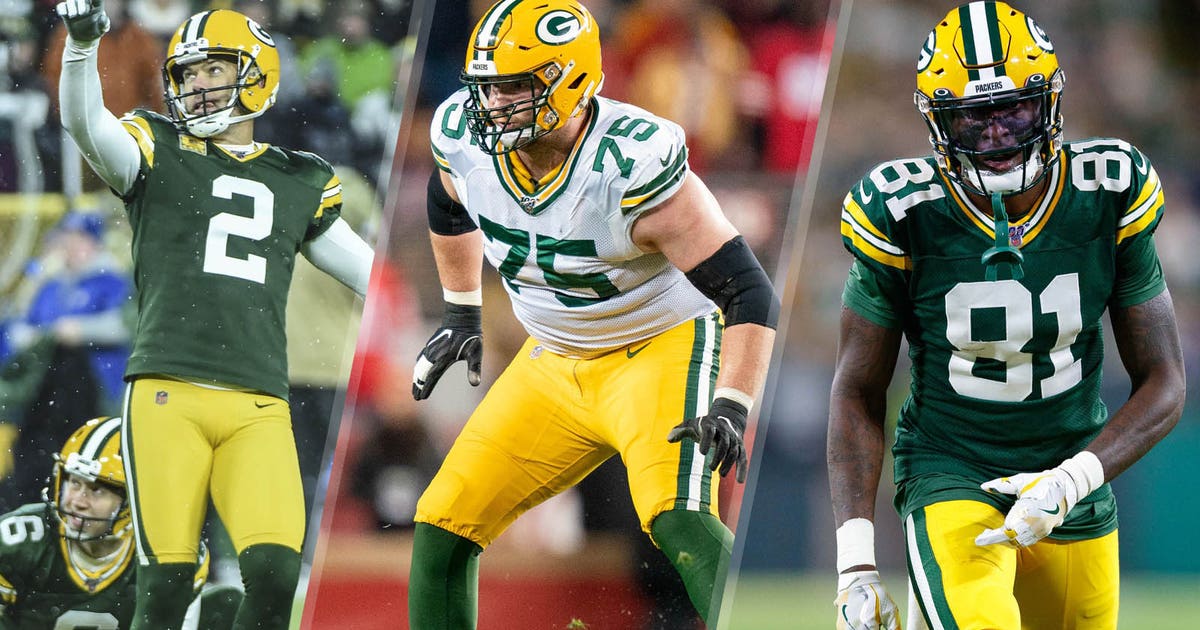Green Bay Packers 2020 impending free agents primer


Brian Gutekunst has not been shy in making free-agent moves in his first two years as general manager, signing Adrian Amos, Preston Smith and Za’Darius Smith last offseason, for example. However, he’s not been as big in re-signing Packers players who became unrestricted free agents. In 2019, Green Bay had 10 unrestricted free agents going into the offseason and Gutekunst re-signed just one — cornerback Davon House. Last offseason, again Green Bay had 10 players hitting unrestricted free agency and again just one returned (tight end Marcedes Lewis, who, like House a year earlier, is set to hit free agency again). Besides Lewis, Gutekunst and the Packers have several other key players who they’ll have to make decisions on whether to bring back to Green Bay or not. FOX Sports Wisconsin takes a look at the 16 players set to hit free agency. (Note: free-agent and salary information via OverTheCap.com).
The exclusive rights free agents
An exclusive rights free agent can only be signed by the Packers, as long as Green Bay tenders that player an offer. If not, that player becomes an unrestricted free agent. Green Bay’s exclusive rights free agents are: WR Jake Kumerow, WR Tyler Lancaster, WR Allen Lazard, S Chandon Sullivan and DT Tyler Lancaster.
WR Geronimo Allison, unrestricted
2019 stats: 16 games (6 starts), 55 targets, 34 catches, 287 yards receiving, 2 touchdowns
2019 cap number: $2,800,000
Why the Packers would re-sign him: A dependable player who fits in just fine as a No. 3 receiver. Allison had the second-most snaps of any wide receiver (57.42%) behind only Davante Adams. He had a career-high 55 targets and 34 receptions in 2019. Green Bay gave him a nice raise last offseason, when he was a restricted free agent, with a $1.45 million base salary with a $750, 000 signing bonus and $500,000 roster bonus. He wouldn’t be an expensive re-sign.
Why they wouldn’t: After being a big-play receiver in his limited time in 2018 – 20 catches in five games with an average of 15.2 yards per catch – Allison actually had fewer receiving yards in 2019 (287) than he did in five games the previous season (303). With Allen Lazard’s role increasing and likely at least one (if not more) wide receiver being added in the offseason, there’s plenty of other (cheaper) options for a No. 4 or 5 role.
OT Bryan Bulaga, unrestricted
2019 stats: 16 games (16 starts), 5 penalties, 3.5 sacks allowed
2019 cap number: $8,350,000
Why the Packers would re-sign him: Bulaga has protected Aaron Rodgers’ right side since 2010. There’s definite advantages to continuity along the offensive line. While Bulaga hasn’t been great, he’s been solid during his tenure. Unless the Packers draft a rookie to man this spot – and do you want a rookie protecting a soon-to-be 37-year-old Rodgers on the outside? – this will be a costly position to fill so why not go with a known factor.
Why they wouldn’t: Bulaga will turn 31 in March, which isn’t ancient by any means but at some point his production will start diminishing, as it does for all players as they age. While Bulaga started all 16 games in 2019, it marked just the third time in his career he’s played in every regular-season game and the second time he’s started all 16. It might be time for a youth movement.
S Ibraheim Campbell, unrestricted
2019 stats: 7 games (3 starts), 14 TKL, 1 forced fumble
2019 cap number: $645,000
Why the Packers would re-sign him: Green Bay clearly likes him. Picked up off waivers in 2018 and re-signed in the offseason despite finishing the year on injured reserve, the team activated him from the physically unable to play list. Campbell saw significant time on both defense (three games of 40+% snaps) and special teams (60%+ snaps in six of seven games and 59.3% in the other). He’s a key special teams guy and would likely be an easy, cheap re-sign.
Why they wouldn’t: Campbell didn’t see much action on defense in the two playoff games – 10 snaps (16%) against Seattle and 5 (9%) against San Francisco. He hasn’t been proven to be much of a playmaker on defense (no career interceptions and just one pass defensed in 53 games (15 starts) over five years). His spot could easily be taken up by a draft pick on a rookie contract.
K Mason Crosby, unrestricted
2019 stats: 16 games, 22-of-24 field-goal attempts, 40-of-41 extra-point attempts, 62.0 touchback %
2019 cap number: $4,850,00
Why the Packers would re-sign him: Let’s be honest, it’s hard to imagine the Packers without Crosby, who has been the team’s kicker since being drafted in 2007. He set career highs in field-goal percentage and touchback percentage in 2019 and only missed one extra-point attempt. Since a disastrous 2012 season, Crosby has made 85.1% of his field-goal attempts. Finding the right kicker can be a tricky proposition – look no further than division-mates Chicago and Minnesota. Bird in the hand, and all.
Why they wouldn’t: Crosby has been consistent, but he doesn’t possess a booming leg like many of today’s NFL kickers. He hasn’t made a kick longer than 54 yards since 2014 and even his career-high in touchback percentage ranked him middle-of-the-pack (13th among those with 30+ KO). Over the past three seasons his 83.8% field-goal accuracy is 18th among kickers with 40+ attempts over that span. As mentioned above, bringing in a new kicker can be fool’s gold, but there’s also a chance for an upgrade.
RB Tyler Ervin, unrestricted
2019 stats (Packers only): 4 games, 11 PR, 11.6 avg; 6 KR, 26.7 avg; 1 rush, 10 yards; 2 rec., 11 yards
2019 cap number: $169,411 (prorated from $720,000)
Why the Packers would re-sign him: Ervin added a little juice to Green Bay’s return game and was used as the team’s third back in the playoffs (he had only 11 fewer snaps than Jamaal Williams). Plus, he was one of the guys Rodgers said he’d like to see back in 2020. An interesting comment about a guy who wasn’t with the team very long.
Why they wouldn’t: Speaking of small sample sizes … Ervin had one punt return for six yards and four kick returns for 55 yards (13.8 average) in the two playoff games. Not exactly sterling numbers. A four-year veteran, surely there are younger, cheaper (and possibly) better options out there for this role.
LB Kyler Fackrell, unrestricted
2019 stats: 16 games (0 starts), 21 tackles, 2 TFL, 1 sack, 10 QB hits
2019 cap number: $2,886,784
Why the Packers would re-sign him: Even in spot duty, he managed to have 10 quarterback hits – which was just two fewer than he had in 2018. Fackrell had a breakout in ’18 with 10.5 sacks and 12 TFL. He also recorded a sack in this year’s playoffs against the 49ers, so Green Bay has the capability for production. He’s a solid backup/emergency linebacker who can comfortably fill-in as a starter.
Why they wouldn’t: With the additions of the Smiths, Preston and Za’Darius, Fackrell’s playing time was way down in 2019. The pair will be back in 2020 so nothing will change from that standpoint. Also, he’ll turn 29 (!) in November. Greener pastures, and more playing time, probably await him elsewhere.
More Packers coverage from FOX Sports Wisconsin
LB B.J. Goodson, unrestricted
2019 stats: 15 games (9 starts), 32 tackles
2019 cap number: $720,000
Why the Packers would re-sign him: Green Bay liked him enough last year to sign him after he spent three years with the New York Giants. He ended up playing 71% of the snaps in the Packers’ loss to the 49ers in the NFC championship. He signed a reasonable contract in 2019 and presumably would do so again in 2020.
Why they wouldn’t: Before that final game against San Fran, Goodson’s playing time had decreased significantly on defense and special teams. He didn’t top 27.8% of the defensive snaps starting in Week 8 until the NFC championship and appeared in more than 20% of the special teams snaps just twice I that span. In other words, he’s replaceable. Also, he had no sacks, TFL, INT, PD or QBH.
WR Ryan Grant, unrestricted
2019 stats (with Packers): DNP
2019 cap number: $520,882 (prorated from $805,000)
Why the Packers would re-sign him: Uh … he’s a veteran. They could use a camp body.
Why they wouldn’t: Let’s face it, did you even know Grant was on the roster? He signed Oct. 19 after being cut by Oakland and was a healthy inactive every week. The fact he couldn’t get on the field in 2019 does not bode well for him being back in 2020. We’ve already expended too many words on this topic.
FB/TE Malcolm Johnson, restricted
2019 stats: DNP
2019 cap number: $408,000
Why the Packers would re-sign him: The Packers must have thought something of Johnson when they signed him to their practice squad in November 2018 and subsequently gave him a futures contract. He’s a restricted free agent and it’d be shocking if any other team gave him a contract. At the very least, the team always needs camp bodies, especially at fullback.
Why they wouldn’t: Johnson is no youngster – he turns 28 in August – and has been oft-injured. Green Bay put him on injured reserve right before the season. Johnson also was put on IR by Cleveland (December 2015), Seattle (May 2017) and San Francisco (September 2018). Johnson hasn’t appeared in an NFL game since Oct. 23, 2016.
TE Marcedes Lewis, unrestricted
2019 stats: 16 games (11 starts), 19 targets, 15 catches, 156 yards receiving, 1 touchdown
2019 cap number: $2,100,000
Why the Packers would re-sign him: Matt LaFleur has shown he likes using 12 personnel (one running back, two tight ends, two wide receivers). Green Bay was 11th in the NFL, using that formation 31% of the time. One of those tight ends is going to be a blocker – which was Lewis’ main role in 2019, and he played in nearly half the offensive snaps (45.06%). Also, he was one of the players Rodgers mentioned he’d like to see back in 2020.
Why they wouldn’t: Lewis will be 36 next season, which is far from ideal for most NFL players but especially so for tight ends. Since 2010, there have only been a handful of tight ends who have been age 36 or older (we’re not including long snappers who are listed as tight ends) and those – Antonio Gates, Tony Gonzalez, Ben Watson and Jason Witten – are more pass-catchers than blockers.
S Will Redmond, unrestricted
2019 stats: 13 games (4 starts), 35 tackles, 1 TFL, 1 pass defensed
2019 cap number: $570,000
Why the Packers would re-sign him: Redmond was a competent fill-in starting safety and role player, recording eight tackles in his first start vs. Philadelphia. He also had games with seven solo tackles (Oakland) and six solo tackles and a TFL (at Dallas). Redmond also played a lot on special teams. He’d be a low-cost reserve.
Why they wouldn’t: After returning from injury in Week 14, Redmond didn’t play any defensive snaps until the playoffs and then not really until the NFC championship game, when he had 24 or 44% (he had only three snaps vs. Seattle). If Green Bay only feels Redmond is a special teams player, you can find that in the draft and get someone with a little upside.
OT Jason Spriggs, unrestricted
2019 stats: Did not play
2019 cap number: $1,592,277
Why the Packers would re-sign him: Perhaps the Packers still see something in the former second-round pick. And a team could always use quality offensive linemen, especially in reserve.
Why they wouldn’t: Spriggs definitely has not lived up to his draft status. He started just nine games between 2016-18 before spending 2019 on IR and appeared in no more than 27% of the offensive snaps in the seasons he did play. Quite frankly, it’s hard seeing a return.
OT Jared Veldheer, unrestricted
2019 stats: 2 games (0 starts), 0 penalties, 0 sacks allowed
2019 cap number: $597,426 (prorated from $831,801)
Why the Packers would re-sign him: Joined the team late after being picked up on waivers – he had retired then changed his mind – and acquitted himself in his brief time. Veldheer started against Seattle in the NFC divisional round and played well. It’s good to know there’s a quality veteran on the bench (or maybe even start …?). Oh, and did we mention Veldheer was the other player Rodgers mentioned by name to be re-signed by the Packers?
Why they wouldn’t: Now that he’s unretired will Veldheer want to be a starter with a team? He hadn’t come off the bench since his rookie year of 2010. He’ll also be 33 next season and hasn’t played more than 13 games in a season since 2015.
FB Danny Vitale, unrestricted
2019 stats: 15 games (4 starts), 1 rush, 3 yards; 12 targets, 7 catches, 97 yards
2019 cap number: $720,000
Why the Packers would re-sign him: It’s Green Bay. He’s a fullback. He knows the offense.
Why they wouldn’t: LaFleur started to not use a fullback as much in the second half of the year. After appearing in as many as 33% of the snaps in Week 3, Vitale didn’t have more than 20% participation in his final seven games (he missed Green Bay’s last three contests with a knee injury). If you’re not going to use a fullback often, either find a cheap, college free agent or just go with an H-back.
CB Tramon Williams, unrestricted
2019 stats: 16 games (7 starts), 36 TKL, 1 TFL, 1 QB hit, 8 PD, 2 interceptions
2019 cap number: $6,375,000
Why the Packers would re-sign him: Despite being 36 years old, Williams was relied upon a lot by Green Bay. He appeared in 71.26% of the defensive snaps and had eight games in which he was in on at least 75% of the plays. According to pro-football-reference.com, opposing quarterbacks had a 79.3 passer rating against Williams with just two TDs.
Why they wouldn’t: Since 2000, there have been just 12 defensive backs who played at 37 or older (Williams will turn that age in March) and most of them were safeties. The list: Mike Adams (2018-19), Ronde Barber (2012), Brian Dawkins (2010-11), Darrell Green (2000-02), Al Harris (2011), Lawyer Milloy (2010), Terence Newman (2015-17), Eugene Robinson (2000), Deion Sanders (2004-05), Otis Smith (2002-03), Charles Woodson (2013-15) and Rod Woodson (2002-03). Also, while Williams was good in 2019, in ’18 he allowed seven TDs and allowed a passer rating of 114.1.







